- Home
- Steven Becker
Wood's Reach Page 3
Wood's Reach Read online
Page 3
With deep water surrounding him, he used one blade of the paddle as a rudder, turning the kayak and allowing the incoming tide to grab the plastic hull. After a few adjustments, he was satisfied with the drift and deployed the two rods, one on each side of the kayak. With the butts set in their holders, he sat back, letting the current take the boat and dipping the paddle in the water whenever he needed a course correction. The first pass yielded nothing, and he reversed course and paddled back to his starting point. Starting to doubt himself, he checked the lines and started his second drift. The sun was just above the horizon now and he knew his window was shrinking. Years ago, when Wood had dredged the small channel to his island, he had dumped the rubble here, making the bottom a prime spot for snapper and grouper, but so far it had yielded nothing.
As the sky brightened, he finished the second drift and set up for the third and last pass, more concerned about his plans for the day than about catching anything now. The work on the house was rather mundane at this point—just demolition—and his mind kept drifting back to the repair bill for his boat. He really wanted to get it back, but piecing together the money to pay the bill would be a challenge. He thought of every option open to him, drawing blanks on most. The last was a man he would use only as a last resort. Hawk, often said to be a descendant of the original wreckers of Vaca Key, was notorious throughout the area for his larger-than-life personality as well as the treasure he pulled from the sea.
Mac had done enough salvage to know that the divers and captains got most of the glory, but it was the moneymen, often in the background, that enriched themselves. Before steamships, the predominant trade route of the treasure-laden wooden ships ran just offshore of here—between the Keys and the Bahama Bank. The square-rigged ships relied on the Gulf Stream’s powerful current to propel themselves back to Europe, but they were hard to maneuver and often collided with the shallow reefs just offshore. This area still held more than its share of the gold, silver, and jewels that had been lost over the centuries as the treasures of the Americas was shipped to finance the wars of Europe. Hawk had a reputation for skirting the law and reaping the bounties from long-lost wrecks most didn’t know existed, as well as having his competitors mysteriously disappear.
The thumb drive supposedly held the answer to a riddle that had plagued Mac for years, and he knew Hawk would pay for it. Mac and Wood had discovered a section of an old Mayan wreck while rebuilding the No Name Key Bridge twenty-odd years ago. Circumstances and a sibling feud between the remaining twin chiefs of an indigenous tribe had put the project on the back burner. The brother was dead, but the sister remained at large and still claimed the rights to the site. Salvage around any historic site was a bureaucratic nightmare, but without ties to the original inhabitants of the islands, it had been impossible to get a permit for the search. Hawk had offered many times to buy the information they had, but first Wood, and now Mac, refused to sell. Maybe it was time to consider it.
Without even a bite, he finished the drift, reeled in the lines and paddled back to the island, still wondering what to do. He reached the beach and pulled the kayak back to its resting place, but instead of leaving the two rods there, he carried them back to the clearing and set them against the shed to be rerigged. When you don’t catch fish, you have to change things up. Before his next attempt, he would tie on fluorocarbon leaders and new lures.
Still unsure what to do about his boat and the thumb drive, he climbed the ladder and started taking his frustration out on the charred wood studs remaining at the back of the house. The heat came with the sun, and sweat poured off him as he worked. After tearing out the last wall, he stacked the studs and stared out at the open expanse of water. Flats boats were moving toward the bonefish and permit grounds. Several larger vessels were heading into the deeper waters of the Gulf, after the grouper and snapper that were more abundant there. He was about to turn away when one of the boats turned out of the channel and approached the island.
He waited until the boat committed, and immediately saw the Monroe County Sheriff’s insignia on its side. A uniformed man was behind the wheel, but Mac didn’t recognize him or the other man, who was dressed in khaki pants and a button-down shirt. He figured they just wanted a statement about the chase yesterday, but he was still uneasy. The law coming all the way out here probably wasn’t good news. He climbed down the ladder and walked quickly to the clearing.
The deputy had done a good job navigating the narrow cut and had already tied a line to the aft cleat on Mac’s center-console by the time he reached the beach.
“You Mac Travis?” the man next to him called out.
“That’s me. What can I do for you?” He tried to stay calm and polite.
“Mind if we come ashore and talk to you?”
Mac couldn’t see any harm, and with the deputy there, he didn’t think it would do any good if he protested. “Fine by me, but you’ll have to get your feet wet.”
The man took a step to the gunwale and looked over the side into the calf-deep water. “This won’t take long. We can just talk here.”
Mac would have laughed except for the official nature of the visit. “I’ve got work to do. Mind if we get right to it?”
“Word’s gotten out that you’re doing some construction out here.”
Mac wasn’t sure where this was going. “Just some repairs is all.”
“Sorry. I’m the building inspector for the county,” he said and held out a laminated card with his picture. “You’re going to need a permit to rebuild that house in there.” He paused. “There are some zoning issues that have come up as well.”
“I’m just fixing what was here,” Mac said. He balled his fists and took a step closer.
“No need for that,” the inspector said. “Just come into the office and file for a permit.”
Mac looked at both men. He had not meant to show aggression, but his natural disdain for bureaucrats had gotten the better of him. “I’ll do that,” he said.
“You’re going to have to stop work pending approval,” the man said, holding out a clipboard. “And the payment of the fines.”
Mac looked at him, his first reaction was to make the man get out of the boat and present him with the paperwork, but he thought better of it and waded toward the sheriff’s boat.
“Sign here, that you received this notice.” The man offered the clipboard to him.
Mac wasn’t about to read it. He had known he was screwed the minute the boat had pulled into the cut; he just hadn’t known how badly. After scrawling his name on the bottom of the page, he handed it back to the inspector, who tore off a copy and returned it to him. The deputy wasted no time. He went forward and released the line, started the engine, and backed out of the cut. Mac stood there, knee-deep in the water with the paper in his hand, watching as the boat turned and sped for Marathon.
Finally he waded back to the beach and walked back to the clearing. He considered having a beer but thought better of it. In the shade of an undamaged palm tree, he sat and looked blankly at the notice. After a few minutes, the words started forming; the first thing he noticed was the box checked at the bottom indicating triple permit fees for starting work without a permit.
His tossed the paper aside and stared at the house, knowing he somehow owed it to Wood and Mel to finish it. Between the cost of repairing his boat and now this, he regretted what he had to do. There was always the chance that, if he was able to walk into the building department with the money this afternoon, they would waive the triple fee. It was worth a shot, no matter how unlikely. If that failed, he would need to see Hawk—and soon.
Behind the newly rebuilt shed, he stood under the spigot mounted above his head. One of his only concessions to comfort was hot water, and he winced as the water ran cold before the small on-demand heater kicked in and warmed it. When the house was rebuilt, he would set new water tanks on the roof, their dark color providing enough solar heat even during cloudy periods for the water to hold in the eightie
s. The small propane heater would then kick in and boost that easily to the hundred degrees he now enjoyed. Finished with his shower, he picked through his pile of clothes, not really sure what was clean or dirty, before selecting cargo pants and a worn T-shirt. After dressing, he went into the shed, grabbed the thumb drive from the shelf, and stuffed it into his pocket.
The center-console cut effortlessly through the glassy water. What little wind there had been this morning had died now. He passed the flat where the boat had grounded yesterday, noticing it was gone, and thirty minutes later he rounded the marker and entered the small lagoon for the Thirty-Third Street boat ramp and the Marathon Yacht Club. Tying the boat to the pier, he grabbed the keys and started walking.
Chapter Five
Mac figured he should check with the building department first; he already knew where he could find Hawk later. From the boat ramp, he walked the quarter mile to US-1 and turned to the right. He stayed to the edge of the sidewalk, dodging several bicycles and jogging strollers in the few blocks before he reached the government offices. Standing in front of the door, he waited a few long minutes, clutching the rolled-up paper in his hand, desperately wanting to avoid facing what lay inside.
Finally, he braved the entrance and was assaulted by the chill of the government-issued and taxpayer-paid air-conditioning. Shivering, he proceeded to the counter marked Building and waited. Fortunately there was no line, or he probably would have walked out. An auburn-haired woman saw him and approached. Immediately he smiled at her, recognizing the familiar face.
“Hey, Sheryl,” he said.
“Mac,” she replied. “What can I help you with?”
He wondered about the coldness of her greeting. She had never been a close friend, but they had known each other from his days with Wood, when they had come here regularly to pull permits for their bridge contracts.
“Thought you had moved,” he said.
“Well, things don’t always work out,” she replied.
Word had gone out that she had moved up to Tampa with Will Service, a local fly-fishing guide. There were rumors floating around that Will had gotten mixed up with a local poaching ring, but that was all he knew. His lack of interest in the news kept him off the coconut telegraph. That might explain her attitude, he thought. He unrolled the paper and laid it out facing her.
She glanced at it. “Let me see what I can do for you,” she said and left him standing alone.
His stomach churning, he watched her walk away. While he waited, a harried clerk came out to help a local couple who had come in just after him. He listened to their laundry list of complaints, sympathizing with them as they just shook their heads when every request they made was met with a no.
“Mac, why don’t you come back here?” Sheryl said, opening the drop-down access built into the counter.
He entered the back area, almost laughing that the government had gone so far off the rails that they needed physical barriers between them and the people they were supposed to serve. Sheryl led him to a line of offices and knocked lightly on an open door. The man sitting behind the desk motioned them in and Mac reluctantly sat.
“Good luck, Mac,” she said and walked out the door.
He wanted her to stay. There was something about her manner that reassured him things might not be as bad as he expected. “Can’t you stay?”
“Got to go. You know where to find me if you want to catch up,” she said and left.
Mac watched her until she rounded the corner. He turned to the man at the desk. “Well?” he asked impatiently. If they had bad news, he wanted it over quickly.
“Mr. Travis,” he started.
This was not going well. “Just Mac is fine.”
“Mr. Travis. We need to talk about the project you are working on.”
Mac glared at him, waiting for him to continue.
“It seems there was no permit for the original structure, septic system, or cisterns.”
Mac lowered his head. He had expected bad, but this was worse. “And…?”
“Back when Woodson built it”—he cleared his throat—“things were a little looser around here, but these days, to rebuild a structure that we don’t acknowledge as existing is no easy matter—especially out there.”
Mac knew where this was going. The federal and state governments had become stricter through the years about the backcountry—restricting access, creating marine sanctuaries, and limiting building. “It was his land.”
“Well, that’s the other thing. His daughter owns it now, through his estate. If you want to go through the process of rebuilding whatever he had out there, you better start with getting approval from her.”
Mac had enough. “Can you write down the procedure for me?” He felt the blood pounding in his ears and knew he needed to get out of here. The man reached into a drawer and pulled out a form.
“These are the steps. You need to get Ms. Woodson’s notarized signature allowing you to do the work and submit the package with eight sets of signed and sealed plans,” he stuttered again. “And we’ll be sending Ms. Woodson a copy of the notice as well.”
Mac took the paper and looked at the agencies involved. From the Army Corps of Engineers to Fish and Game, the list was daunting if not impossible. Just getting the plans and engineering done would cost him thousands. Then he looked at the bottom and saw a list of fees. After a quick calculation, he realized the permit alone would be close to thirty thousand dollars.
He dropped the form on the man’s desk and rose to leave.
“There are severe consequences if you continue construction without a permit.”
Mac glared at him and left. He retraced his steps to the counter and caught Sheryl’s sympathetic eye as he opened the gate. Head down, he walked quickly, not caring about the looks he received from the people sitting in the uncomfortable stack chairs, waiting their turn. He left the building and walked back to the highway, wanting a drink as badly as he ever had.
He passed by Thirty-Third Street, almost turning to go back to the boat ramp, but decided that would be running away from his problems. Fingering the thumb drive in his pocket, he crossed the street and continued north, turning left on Thirty-Fifth. He walked to the end of the street, past stacks of lobster traps on the left and the parking lot for Keys Fisheries on the right, before climbing the steps to the second-floor tiki bar.
The Rusty Anchor would have been his first choice and even worth the walk to see Rusty, but Hawk would not be found there. The bar was a mix of tourists and locals, mostly associated with the charter fishing boats moored below in a small harbor.
He looked around and saw Hawk sitting at a table in back, carefully picking oysters off their shells with a small fork. Before he could approach, he heard a familiar voice.
“Yo, Mac.”
He immediately recognized the Cajun accent and looked to the bar, where he saw Trufante. Moving through the crowd, he headed toward his mate. At least he might steel himself with a drink and have a few laughs to break the tension before he had to deal with Hawk. He joined him at the bar and looked out past the narrow work area for the bartenders at the view of the water below the rolled-up plastic used on rainy days. Thankful for the breeze that cleansed the air, taking the cigarette smoke with it, he slid into an empty spot.
“How you been, Tru?” he asked.
“Damn fine, Mac. Key West didn’t work out too well, except for meeting this one.” He turned to the woman on the other side of him, pecking away at her phone. “This here’s Pamela, but I call her Pajama Bama. Say hey to Mac Travis, babe,” he said.
She looked up, and Mac’s first thought was to wonder what she was doing with Trufante, but the Cajun was a charmer, and Mac never doubted his ability to date over his head.
“Hello, Mac Travis,” she said. “How ’bout a five o’clock somewhere?”
Mac was amused when she started humming the melody of the Jimmy Buffett song. “Beer’d be good,” he said, not trusting the scotch on the she
lf behind the bar.
“Get him a shot too,” Trufante said.
“Yah. One bourbon, one shot, and one beer,” she called out to the bartender.
Mac smiled for the first time today. The bartender brought over the shot and beer and he toasted his friend. Whatever it was went down hard and he took a long swig of the beer to chase it. Turning away from the bar to hide his expression, he saw two men enter the room—the same men from the grounded speedboat yesterday. He watched as they walked to Hawk’s table, where they stood for a minute before sitting.
“Hey,” he whispered to Trufante. “You know those dudes with Hawk?”
“What are you worried about Hawk for? Hey, is that what you’re doing here? I wondered when you walked in the door why you were here instead of at Rusty’s.”
“I could ask you the same question,” Mac said, already suspecting that Trufante either owed Rusty money or was looking for work here. “Anyway, have a look.”
Trufante turned to Pamela and looked over her shoulder. “Hmm. Babe, have a look there. Those the dudes you bid against?”
They were all looking at the table now, but before Mac could change his stance, he saw the man he had nicknamed Ironhead stare straight at him, or was it past him? Trufante stood several inches above him and right behind.
“Tell me a story, and give me the short version,” Mac told the Cajun, wondering if he would be dragged into another of his messes.
“Well, ya see… ” Trufante started.
He stopped short when Hawk rose and started toward them. Ironhead was about to get up to follow, but with a hand gesture, Hawk ordered him back in his chair. “Take her and get out of here,” he whispered to Trufante. “I’ll catch up to you later.”

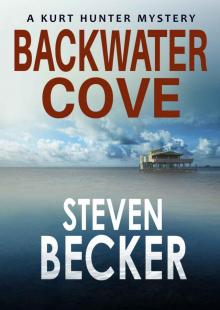 Backwater Cove
Backwater Cove Storm Surge: A Fast Paced International Adventure Thriller (Storm Thriller Series Book 3)
Storm Surge: A Fast Paced International Adventure Thriller (Storm Thriller Series Book 3)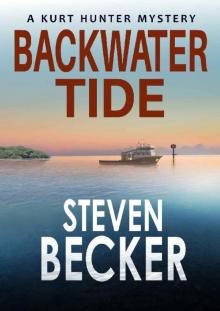 Backwater Tide
Backwater Tide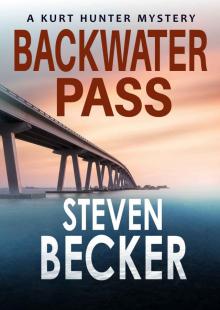 Backwater Pass
Backwater Pass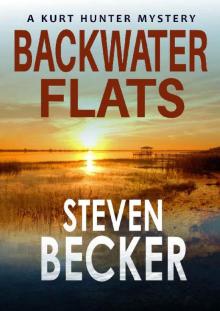 Backwater Flats
Backwater Flats Wood's Revenge
Wood's Revenge Haitian Gold
Haitian Gold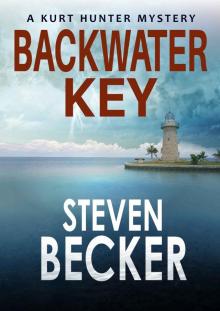 Backwater Key
Backwater Key Wood's Tempest
Wood's Tempest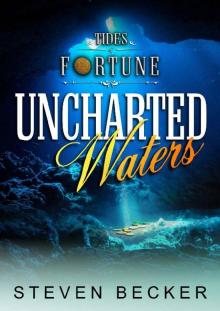 Uncharted Waters
Uncharted Waters Tuna Tango
Tuna Tango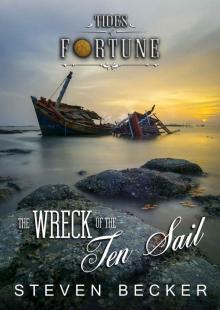 The Wreck of the Ten Sail
The Wreck of the Ten Sail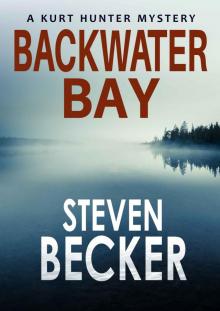 Backwater Bay (Kurt Hunter Mysteries Book 1)
Backwater Bay (Kurt Hunter Mysteries Book 1) Storm Clouds
Storm Clouds Wood's Wall
Wood's Wall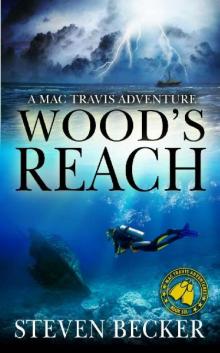 Wood's Reach
Wood's Reach Wood's Fury
Wood's Fury Storm Rising
Storm Rising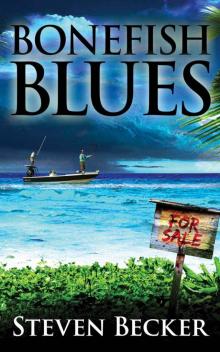 Bonefish Blues
Bonefish Blues Wood's Harbor: Action & Sea Adventure in the Florida Keys (Mac Travis Adventures Book 5)
Wood's Harbor: Action & Sea Adventure in the Florida Keys (Mac Travis Adventures Book 5)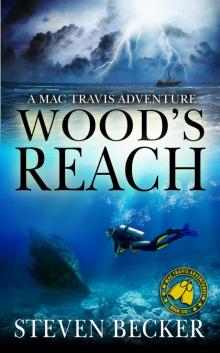 Wood's Reach: Action & Sea Adventure in the Florida Keys (Mac Travis Adventures Book 6)
Wood's Reach: Action & Sea Adventure in the Florida Keys (Mac Travis Adventures Book 6)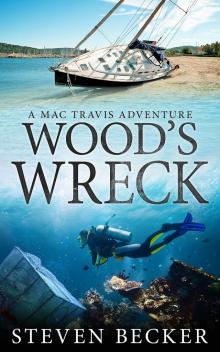 Wood's Wreck
Wood's Wreck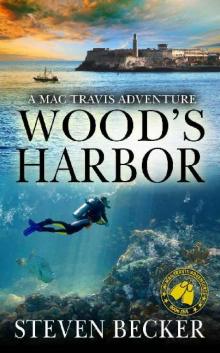 Wood's Harbor
Wood's Harbor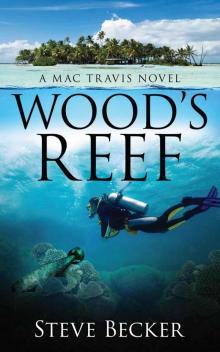 Wood's Reef
Wood's Reef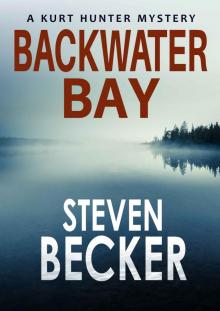 Backwater Bay
Backwater Bay